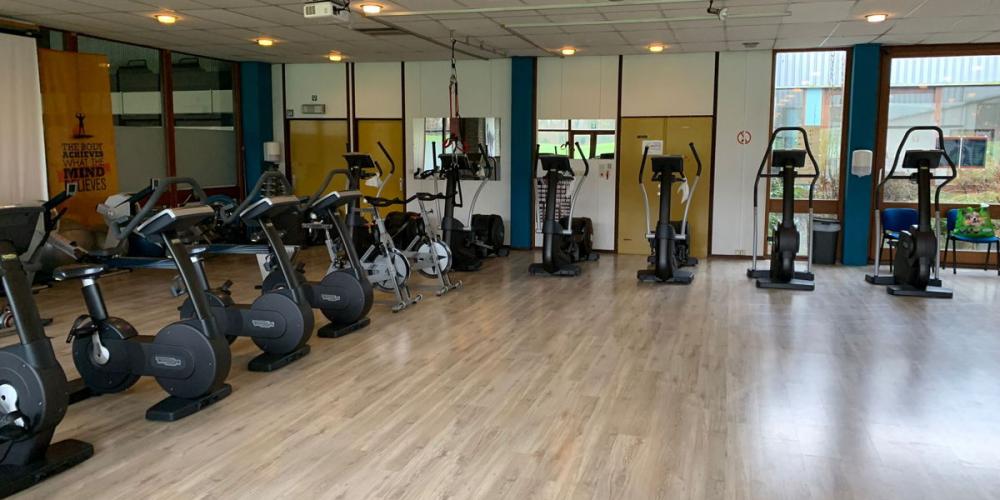
VUB and UZ Brussel rehabilitation project for cancer patients expands thanks to Basic-Fit
Eight years ago, Professor Nele Adriaenssens, coordinator of Oncological Rehabilitation at the UZ Brussel and PI of the VUB Rehabilitation Research group, started a rehabilitation project for people with or recovering from cancer. The project, known as Just Move, has since grown into a successful support and aftercare programme run by UZ Brussel, offering 250 patients a year (125 under Covid regulations) a 12-week physical aftercare programme following their treatment. On Wednesday 2 February, the project enters a significant next phase: thanks to gym chain Basic-Fit, Just Move will have better and more modern equipment and can thus support more people.
Adriaenssens: “We will get 13 cardio machines and nine strength machines. From Wednesday, we will have more equipment that can be used in a more multifunctional way. Above all, the equipment is much more modern and durable. They are recharged by their own use, which makes a difference to your energy bill, of course.
New equipment thanks to cooperation with Basic-Fit
In autumn 2019, the Just Move gym in Wemmel decided to discontinue its business and the VUB Rehabilitation Research group took over location and equipment, but retained the name, which in the meantime enjoyed a certain renown. Adriaenssens: “Thanks to a successful benefit, we were able to raise money for this and continue our programme. The next step was to replace the outdated equipment. We found a good partner in Basic-Fit, which is now providing us with fitness equipment that consumes little to no electricity. This allows us to take rehabilitation and research to an even higher level. For example, we have much more freedom in where we can place the equipment because we are no longer dependent on where the power sockets are. This can only benefit our programme.”
Kevin Ayeni, marketing manager Benelux at Basic-Fit: “We at Basic-Fit were so charmed by the beautiful Just Move project that we didn’t hesitate for a moment to support it. We can only applaud initiatives that bring people together through sport to improve their quality of life and work on their mental and physical resilience.”
Rehabilitation and top research
The Just Move rehabilitation project is unique. Adriaenssens: “The concept consists of rehabilitation in groups and outside the hospital. Group rehabilitation has a significant psychosocial benefit through contact between peers, the exchange of tips and tricks and mutual support. We also found it important not to do this in hospital but in a place away from suffering, in a place where people can start a new, positive chapter in a green environment. We then found the ideal place at Just Move in Wemmel.”
The programme quickly became a success and was part of a large national multicentre study, “Quality of life improvement and reintegration of adjuvant-treated women with breast cancer through physical training and lifestyle counselling”, funded by the National Institute for Health and Disability Insurance (RIZIV). Adriaenssens: “We now know that physical activity can not only reduce the chances of relapse of people with or after cancer, but it also has an important preventive effect on the development of at least seven cancers. We are also studying how physical activity can help increase the effectiveness of and tolerance to cancer treatments, and how we can combat side effects of cancer and cancer treatments.”
The Just Move programme
The programme consists of exercise therapy aimed at strengthening weakened muscles, improving endurance and fitness, and increasing flexibility. The programme also addresses further side effects of cancer with specific back exercises, balance training, treatment of lymphoedema problems, etc. Most patients come twice a week for 12 weeks and follow an individualised programme. The guidance is provided by a sports physiotherapist after an extensive consultation with Prof Adriaenssens.
Adriaenssens: “The patients are given the green light for rehabilitation by their doctor, after which we carry out a number of physical tests. After 12 weeks, we test the patients again and try to refer them specifically to a physiotherapist in primary care or the regular sports offer.”
“Regular exercise for the (former) cancer patient is not only good for the healing process; it also offers a certain degree of self-esteem and joy in life! And the fact that this happens with fellow sufferers gives you a sense of belonging,” says Prof Paul De Knop, former VUB rector and cancer patient
Ambitions for the future
Prof Adriaenssens is already looking further afield: “Collaborations have recently been set up within the Brussels Health Campus. We want to tackle the long-term effects of cancer and cancer treatments, such as fatigue, physical complaints and consequences and neurocognitive dysfunction, outside the hospital context, with an innovative multidisciplinary programme of physical rehabilitation and mental and neurocognitive remediation as well as nutrition, physical integrity and aesthetics.”